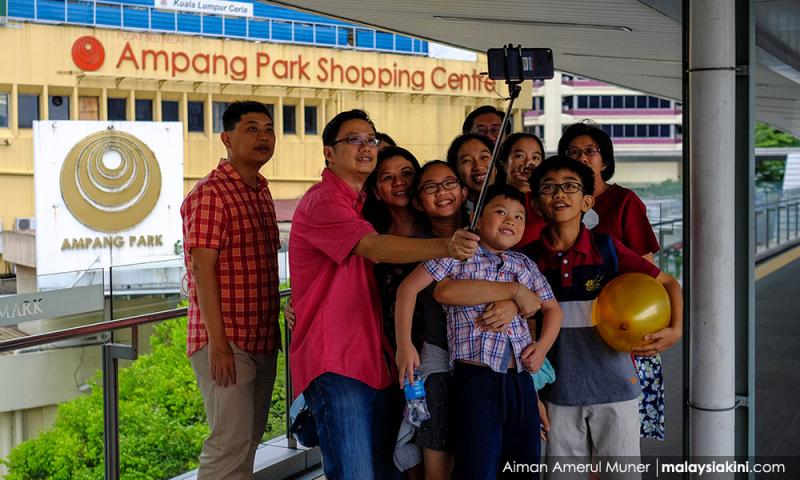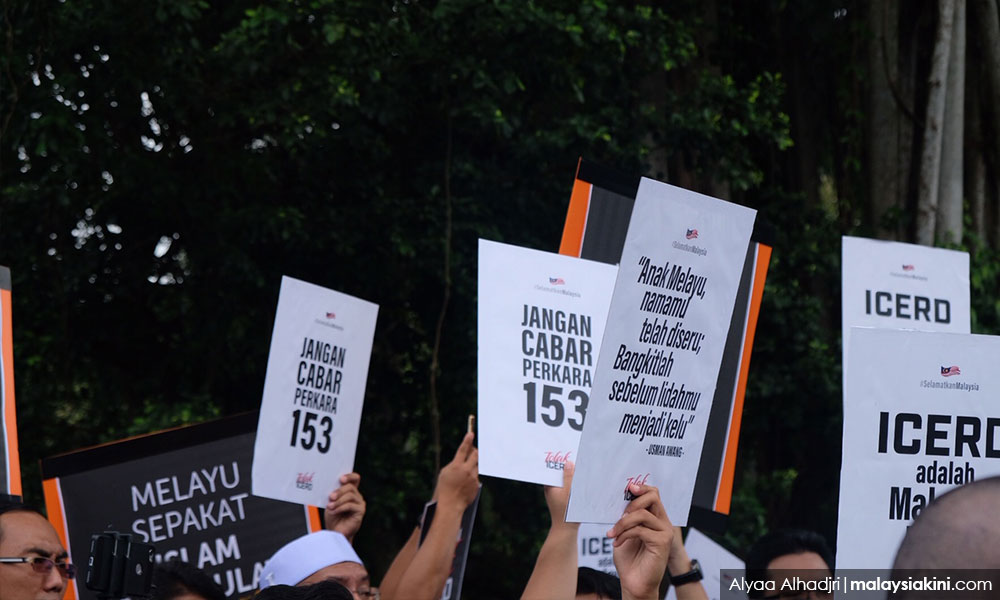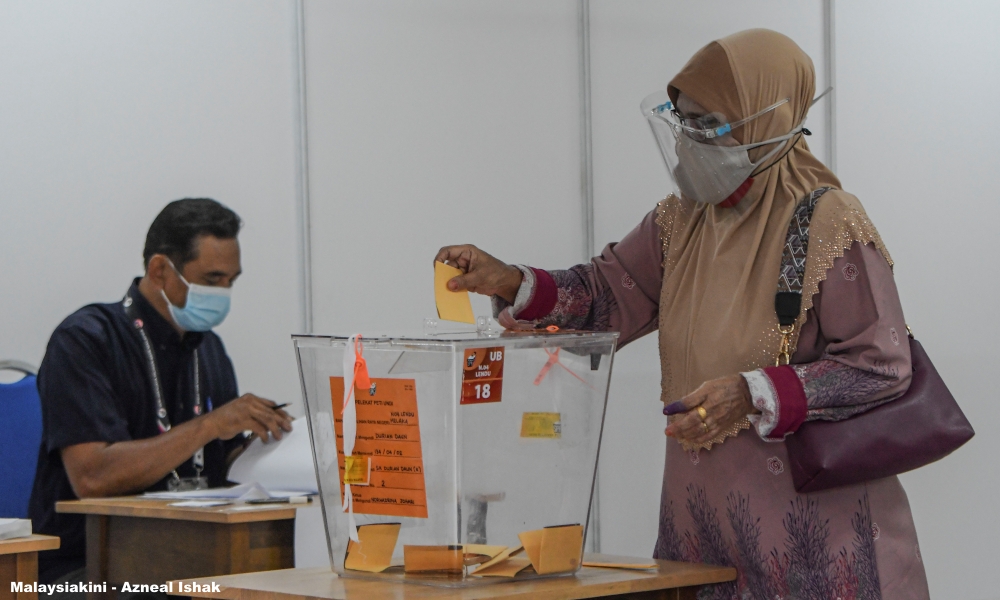
S Thayaparan
"We want to get it right this time."
COMMENT | In his reply to my article – at least I think it was a reply to my 'Malay appeasement' article – Zikri Kamalruzaman claimed the best way to build bridges with the dominant polity is to get rid of the old guard and persuade the “Malays” that they would not be “destroyed” by the DAP as the Malay uber alles propaganda proclaims.
Of course, everyone knows that the Malays are the dominant polity but the issue of electoral importance has been muddied after decades of electoral malfeasances, but more importantly, new dreams of unfair electoral domination.
PAS central committee member Khairuddin Aman Razali said: "There are long-term (needs) that require us to win the next general election with a two-thirds majority. (Upon achieving this) the electoral boundaries need to be changed to benefit Muslims. We also need to increase the number of parliamentary seats in Malay-majority areas."
Zikri wrote: “… the reason why these Umno or Perikatan Nasional-supporting Malays reject messages of inclusivity is not that they are uneducated, stupid, lazy, or anything of that sort which some people who claim to be liberals and non-racists believe it to be” but rather because of confirmation bias or belief perseverance.
I suggest a rather simple explanation. Nobody wants to give up their special privileges, especially when those privileges sustain families and communities through the vagaries of a changing economic and geopolitical landscape.

Hence, if the government is giving you economic, education, housing and other subsidies by virtue of race, and another group comes along demanding for a more egalitarian system to ensure that everyone gets a taste of the pie, you would of course reject such demands.
Does supporting such racist policies make one racist? That is the question, right? As my friends in PSM tell me, everyday interactions between the various racial communities are fairly good, especially amongst the disenfranchised.
There is an understanding which transcends the political system. But, of course, there are resentments that do not play out in our everyday interactions.
Non-Malay parents have to somehow find the money to ensure that kids get a good education because they understand that their kids may miss out on the quota in public universities.
They fear religious and racial radicalisation of our public school system, so they send their children to vernacular schools. And of course, vernacular school education is then blamed for disunity by the very people who enact policies that divide us.
Now, of course, the average Malay has nothing to do with this beyond voting for political operatives who stir up such issues and so, while there may be no malicious intent when a vote is cast, the consequences for voting for these political operatives is very often to the detriment of the non-Malay community.
Sustaining discrimination
The fact is, non-Malay politicians, whether the old guard or the new, are never going to talk about taking away the special privileges of the Malays.
They are never going to talk about making our public taxpayer-funded public universities more inclusive, they are never going to talk about the subsidies given to only Malays should be taken away. That is the way the system has been built.
Here is the reality, if the propaganda of the Malay uber alles political operatives were true, that would mean that non-Malay political operatives were actually doing their job. They were offering up an alternative and this has never really been the case.
You could blame it on the propaganda, you could blame it on religion but the cold hard truth is, that the mainstream political system is predicated on keeping us apart by design. You could look back at the colonial and then the post-colonial history of this country to discover why, but what would be the point, right?
The hypocrisy of it really stinks. I mean, take the weaponisation of Bahasa Malaysia, for instance. As reported in the press – “Prime Minister Ismail Sabri Yaakob has reprimanded government agencies, government-linked companies and the private sector for prioritising the use of English over Bahasa Melayu at their events, meetings, and conferences, and on their products.”

Honestly, maybe all these GLCs and the private sector are using English because all the sons and daughters of the elites are educated in Western private schools and universities and have lifestyles far removed from the average Malay?
Of course, Malay political operatives would weaponise BM or engage in various culture wars because they cannot explain the failures of the Malay uber alles governments. So, this is really not about the language but rather something to drum up support and bash the non-Malay private sector with.
While everything Zikri says about the reasons why Anwar Ibrahim and the old guard should go may be true - and indeed I agree with many of Zikri’s points - I still have no idea how to build bridges with the Malay polity.
I think Zikri is right about the branding issue when he wrote – “People who follow brands usually become fans for one of two reasons: it's established and reliable, or it's new and exciting.”
Here’s the thing, the existing system as advocated by Umno/PN and their permutations is established and reliable. Would Malays, especially the folks who vote for Umno/PN really want something new and exciting, especially if that new and exciting system goes against the existing system?
In practical terms how does one build bridges, then?
"We want to get it right this time."
- Daim Zainuddin, chairperson of Council of Eminent Persons, in recommending changes to Malaysia Bumiputera policies
COMMENT | In his reply to my article – at least I think it was a reply to my 'Malay appeasement' article – Zikri Kamalruzaman claimed the best way to build bridges with the dominant polity is to get rid of the old guard and persuade the “Malays” that they would not be “destroyed” by the DAP as the Malay uber alles propaganda proclaims.
Of course, everyone knows that the Malays are the dominant polity but the issue of electoral importance has been muddied after decades of electoral malfeasances, but more importantly, new dreams of unfair electoral domination.
PAS central committee member Khairuddin Aman Razali said: "There are long-term (needs) that require us to win the next general election with a two-thirds majority. (Upon achieving this) the electoral boundaries need to be changed to benefit Muslims. We also need to increase the number of parliamentary seats in Malay-majority areas."
Zikri wrote: “… the reason why these Umno or Perikatan Nasional-supporting Malays reject messages of inclusivity is not that they are uneducated, stupid, lazy, or anything of that sort which some people who claim to be liberals and non-racists believe it to be” but rather because of confirmation bias or belief perseverance.
I suggest a rather simple explanation. Nobody wants to give up their special privileges, especially when those privileges sustain families and communities through the vagaries of a changing economic and geopolitical landscape.

Hence, if the government is giving you economic, education, housing and other subsidies by virtue of race, and another group comes along demanding for a more egalitarian system to ensure that everyone gets a taste of the pie, you would of course reject such demands.
Does supporting such racist policies make one racist? That is the question, right? As my friends in PSM tell me, everyday interactions between the various racial communities are fairly good, especially amongst the disenfranchised.
There is an understanding which transcends the political system. But, of course, there are resentments that do not play out in our everyday interactions.
Non-Malay parents have to somehow find the money to ensure that kids get a good education because they understand that their kids may miss out on the quota in public universities.
They fear religious and racial radicalisation of our public school system, so they send their children to vernacular schools. And of course, vernacular school education is then blamed for disunity by the very people who enact policies that divide us.
Now, of course, the average Malay has nothing to do with this beyond voting for political operatives who stir up such issues and so, while there may be no malicious intent when a vote is cast, the consequences for voting for these political operatives is very often to the detriment of the non-Malay community.
Sustaining discrimination
The fact is, non-Malay politicians, whether the old guard or the new, are never going to talk about taking away the special privileges of the Malays.
They are never going to talk about making our public taxpayer-funded public universities more inclusive, they are never going to talk about the subsidies given to only Malays should be taken away. That is the way the system has been built.
Here is the reality, if the propaganda of the Malay uber alles political operatives were true, that would mean that non-Malay political operatives were actually doing their job. They were offering up an alternative and this has never really been the case.
You could blame it on the propaganda, you could blame it on religion but the cold hard truth is, that the mainstream political system is predicated on keeping us apart by design. You could look back at the colonial and then the post-colonial history of this country to discover why, but what would be the point, right?
The hypocrisy of it really stinks. I mean, take the weaponisation of Bahasa Malaysia, for instance. As reported in the press – “Prime Minister Ismail Sabri Yaakob has reprimanded government agencies, government-linked companies and the private sector for prioritising the use of English over Bahasa Melayu at their events, meetings, and conferences, and on their products.”

Honestly, maybe all these GLCs and the private sector are using English because all the sons and daughters of the elites are educated in Western private schools and universities and have lifestyles far removed from the average Malay?
Of course, Malay political operatives would weaponise BM or engage in various culture wars because they cannot explain the failures of the Malay uber alles governments. So, this is really not about the language but rather something to drum up support and bash the non-Malay private sector with.
While everything Zikri says about the reasons why Anwar Ibrahim and the old guard should go may be true - and indeed I agree with many of Zikri’s points - I still have no idea how to build bridges with the Malay polity.
I think Zikri is right about the branding issue when he wrote – “People who follow brands usually become fans for one of two reasons: it's established and reliable, or it's new and exciting.”
Here’s the thing, the existing system as advocated by Umno/PN and their permutations is established and reliable. Would Malays, especially the folks who vote for Umno/PN really want something new and exciting, especially if that new and exciting system goes against the existing system?
In practical terms how does one build bridges, then?

Support Bossku...
ReplyDelete